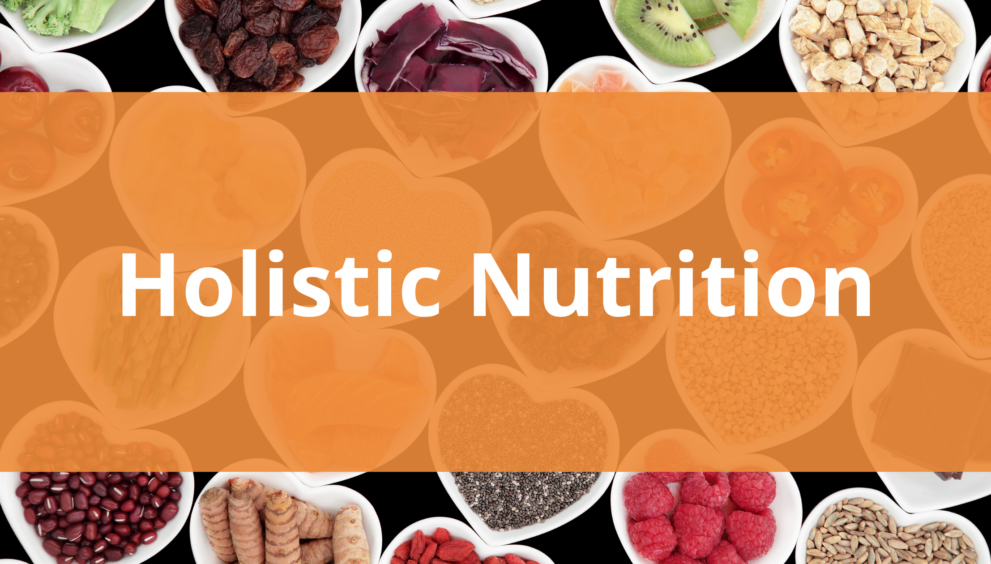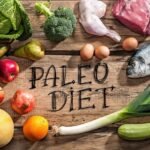“Unlock the Power of Holistic Nutrition for Better Health”

When it comes to health, many people think of nutrition as simply a matter of eating the right foods to fuel the body. However, nutrition is far more than just the physical nourishment we receive from our diet. Holistic nutrition takes a broader approach by considering the whole person—body, mind, and spirit—and how different aspects of your life can influence your well-being.
In this guide, we’ll dive deep into what holistic nutrition is, why it’s important, and how you can incorporate it into your daily life. Whether you’re looking to improve your overall health, manage stress, or just feel more energized, holistic nutrition can offer practical solutions that go beyond the basics of calorie counting and macronutrient ratios.
What Is Holistic Nutrition?
Holistic nutrition is a health approach that focuses on nourishing your body, mind, and soul in a balanced and sustainable way. It’s about looking at the bigger picture of health, rather than just focusing on one aspect—such as weight loss or managing a specific condition. This philosophy emphasizes whole, natural foods that provide more than just essential nutrients but also support emotional and mental well-being.
Unlike traditional nutrition, which often centers on individual nutrients or specific health conditions, holistic nutrition takes into account a person’s lifestyle, environment, and mental state. It encourages a mindful, balanced approach to food, focusing on:
- Whole, unprocessed foods that nourish the body
- Mental health by encouraging a positive relationship with food
- Spiritual wellness by considering the connection between food and the environment
- Physical activity that enhances overall wellness
By adopting a holistic nutrition mindset, you aim to create a lifestyle that supports long-term well-being rather than focusing solely on quick fixes or trends.
Why Is Holistic Nutrition Important?
Holistic nutrition offers numerous benefits that go beyond simply improving your diet. Here are some reasons why it’s becoming increasingly popular:
- Promotes Long-Term Health: It encourages a lifestyle that’s sustainable and works for your body in the long run, rather than focusing on temporary solutions.
- Reduces Stress and Anxiety: By taking care of your mental health and eating whole foods, you’re nourishing your body and reducing the effects of stress.
- Improves Digestion: A balanced, whole-food diet supports healthy digestion, ensuring that your body absorbs the nutrients it needs.
- Increases Energy Levels: When your body is nourished with the right foods, you’ll naturally feel more energized and less fatigued.
- Enhances Mental Clarity: Eating foods that are rich in nutrients helps your brain function optimally, allowing for better focus and productivity.
With all these benefits, holistic nutrition is about achieving a healthy balance between what you eat, how you think, and how you live, all of which contribute to a more vibrant, happier life.
The Core Principles of Holistic Nutrition
To fully embrace holistic nutrition, it’s essential to understand its key principles. These core ideas can help guide your decisions and make the shift towards a more balanced and mindful lifestyle.
1. Whole Foods Over Processed Foods
One of the central tenets of holistic nutrition is focusing on whole, natural foods. These foods are minimally processed and retain the maximum amount of nutrients, fiber, and enzymes needed for optimal health. Eating a variety of fresh fruits, vegetables, whole grains, lean proteins, and healthy fats will ensure your body is getting the nourishment it needs.
2. The Importance of Balance
Balance is key to holistic nutrition. It’s not just about eating enough of each nutrient but ensuring that you’re getting the right balance of macronutrients (carbohydrates, proteins, and fats), micronutrients (vitamins and minerals), and water. For example, a balanced plate should contain a variety of colors from different vegetables and fruits to ensure you’re getting a broad range of nutrients.
3. Mindful Eating
In holistic nutrition, mindful eating is encouraged. This means paying attention to what you’re eating and how it makes you feel. It involves:
- Listening to your body to determine when you’re hungry and full
- Savoring your food by eating slowly and appreciating the taste and texture
- Avoiding distractions, such as watching TV or scrolling through your phone, while eating
Mindful eating helps you build a healthier relationship with food and prevent overeating, which is common in today’s fast-paced world.
4. Nutrition for Mental Health
Holistic nutrition isn’t just about food—it’s also about how food affects your mind and emotions. Eating foods rich in essential nutrients can significantly impact your mood, energy, and mental clarity. For example, omega-3 fatty acids found in fish and flaxseed have been linked to improved mental health, while leafy greens like spinach and kale provide vitamins that support brain function.
5. Sustainable and Ethical Eating
A key component of holistic nutrition is considering the environmental and ethical impact of your food choices. Opting for locally grown, organic produce supports sustainable farming practices and reduces your carbon footprint. Additionally, choosing ethically sourced animal products ensures that the food you consume aligns with your values.
How to Incorporate Holistic Nutrition Into Your Daily Life
Now that you understand the principles of holistic nutrition, it’s time to put them into practice. Here are some actionable steps you can take to incorporate holistic nutrition into your daily routine:
1. Plan Your Meals Around Whole, Natural Foods
Focus on preparing meals using fresh ingredients, such as vegetables, fruits, whole grains, and lean proteins. Limit your intake of processed foods that are high in refined sugars, artificial additives, and unhealthy fats.
Example of a balanced meal:
- Grilled chicken with quinoa, sautéed spinach, and roasted sweet potatoes
- Avocado toast with a side of mixed fruit and nuts
2. Eat More Plant-Based Foods
Try incorporating more plant-based meals into your diet, such as salads, vegetable stir-fries, or vegetable-based soups. Plant-based foods are nutrient-dense, full of fiber, and support a healthy digestive system.
3. Stay Hydrated
Drinking plenty of water is an important part of holistic nutrition. Water aids digestion, supports joint health, and helps maintain skin elasticity. Aim to drink at least 8 glasses of water a day and adjust based on your activity level.
4. Practice Mindful Eating
Take the time to sit down, enjoy your meals, and truly savor the flavors. Avoid eating in a rush or while distracted by your phone or television. By eating mindfully, you will also start noticing how different foods make you feel and how they impact your energy and mood.
5. Get Active
Alongside a balanced diet, physical activity is essential to maintaining good health. Regular exercise can boost energy levels, support digestion, and improve mental clarity. Aim to include activities such as walking, yoga, or cycling into your routine.
6. Take Time to Rest and Rejuvenate
Stress can take a toll on both your mental and physical health. It’s important to prioritize self-care practices such as getting enough sleep, meditating, and practicing relaxation techniques.
Holistic Nutrition and Its Impact on Chronic Health Conditions
Holistic nutrition can be particularly beneficial for individuals managing chronic health conditions. By focusing on a nutrient-dense, anti-inflammatory diet, you can support your body’s healing processes and potentially reduce the severity of symptoms.
- Heart Health: Consuming a diet rich in omega-3 fatty acids, whole grains, and vegetables can help lower cholesterol and maintain healthy blood pressure.
- Diabetes Management: A balanced diet that includes fiber-rich foods, such as legumes and vegetables, can help stabilize blood sugar levels.
- Digestive Health: Eating whole foods that support gut health, such as fermented foods and high-fiber fruits and vegetables, can aid in digestion and reduce bloating or discomfort.
Table: Example of a Holistic Daily Diet Plan
| Meal | Foods Included | Nutrients & Benefits |
|---|---|---|
| Breakfast | Oatmeal with chia seeds, fresh berries, almond butter | High in fiber, antioxidants, omega-3s |
| Lunch | Quinoa salad with chickpeas, avocado, mixed greens, olive oil | Protein, healthy fats, vitamins |
| Snack | Carrot sticks with hummus | Fiber, vitamins, plant-based protein |
| Dinner | Grilled salmon, steamed broccoli, brown rice | Omega-3s, fiber, antioxidants |
| Hydration | Green tea, herbal teas, and plenty of water | Hydration, antioxidants |
Conclusion: Embracing Holistic Nutrition for a Healthier Life
Holistic nutrition isn’t just about what you eat; it’s about creating a lifestyle that promotes overall well-being—physically, mentally, and emotionally. By focusing on whole foods, mindful eating, and a balanced lifestyle, you can enhance your health, improve energy levels, and reduce stress.
Adopting holistic nutrition principles is a powerful tool for managing your health in the long run. So, why wait? Start making small changes today, and experience the lasting benefits of nourishing your body, mind, and spirit. Remember, your health is a lifelong journey, and the choices you make today can have a profound impact on your well-being tomorrow.








































































































































































































































































































































































































































































































